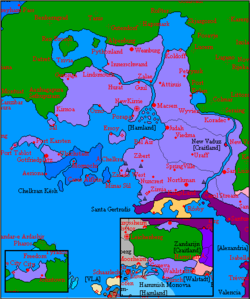Commonwealth of Hamland
| Commonwealth of Hamland Rutomatera del Haemland | |||
| |||
| Motto: Inprobus ut nemo | |||
| Anthem: The King's Song | |||

| |||
| Map versions | 15.2.4 - Present (as the Commonwealth of Hamland) 11.8 - Present (As Hamland) | ||
| Capital | New Kirrie | ||
| Largest city | New Kirrie, Northman, Weanburg, Godfriedplatz, Monoviaville | ||
| Official language(s) | English, Hammish (official), Spanish, Passilisc (regional), German | ||
| Official religion(s) | |||
| Demonym | Hammish | ||
| - Adjective | Hamlander | ||
| Government | Federal Parliamentary Monarchy | ||
| - Seneschal of Hamland | Juan Teadoir | ||
| - Prime Minister | Duke Sinclair | ||
| - Legislature | Chachis de Nutra | ||
| Establishment | September 12th 2006 (Hamland), August 19th 2013 (Commonwealth) | ||
| Area | NA | ||
| Population | 11 | ||
| Active population | 5 | ||
| Currency | Hammish Obol (Ø) | ||
| Calendar | |||
| Time zone(s) | |||
| Mains electricity | |||
| Driving side | |||
| Track gauge | |||
| National website | Hammish Website | ||
| National forum | Hammish Forum | ||
| National animal | Unicorn | ||
| National food | |||
| National drink | |||
| National tree | |||
| Abbreviation | HAM | ||
The Commonwealth of Hamland is a federation of smaller states currently including Hamland, Passas, the Region of the Isles, Anglia, Monovia, Neo Patrova, Schönland and Scottania-Petrynsk. Each region is entitled to its own Governorship and representation in the parliament of the Commonwealth who can elect a Prime Minister. The head of state is the Seneschal. The Commonwealth of Hamland was preceded by the Kingdom of Hamland.
History
The Commonwealth of Hamland was founded in August 2013 following the reform of the Kingdom of Hamland. These reforms marked the beginning of a revival of the Hammish state as well as significant development of the nations of the Commonwealth. The new Commonwealth differed from the Kingdom mainly due to its federal structure which granted constituent nations significantly more autonomy over their governance and cultural development.
The Commonwealth inherited the diplomatic relations of the Kingdom of Hamland including a close alliance with Ashkenatza and Alexandria. The revival of the state put a stronger emphasis on the politics with the political system expanding to include elections to the Chachis Del Nutra. The first Prime Minister of the Commonwealth was Lord Lewis of the Region of the Isles who was followed by Duke Sinclair who was elected in the November 2013 Hammish General Election. Each of these Prime Ministers followed policies which expanded the Commonwealth's economy, diplomatic relations, cultural development as well as establishing the current Commonwealth Space Program.
Politics
The Commonwealth has a multiple party system, with the Hamland National Party, the Social Liberal Party and the Pallisican Imperialist Party. The HNP are the longest existing party dating back to 2008 when Hamland was an independent Kingdom.
Elections are simulated and with minor variations being awarded based on the contributions of the MPs over the last electoral period of one month. The outcome of these elections reflect the actual distribution of votes in the parliament where all citizens are MPs. This means that if three parties, all with one member, contest an election then the votes will be around 35%, 33% and 31%. Following each election the Chachis Del Nutra, or Commonwealth Parliament, will elect a Prime Minister who will appoint their cabinet with the consent of the Seneschal.
The first of the simulated elections occurred after the reconstitution of the state into the Commonwealth of Hamland in September 2013. Since this election the following politicians have served as Prime Minister:
- August 2013- September 2013: Lord Lewis - Social Liberal Party (In coalition with HNP and PIP)
- September 2013 - December 2013: Duke Sinclair - Pallisican Imperialist Party (In coalition with HNP and SLP)
- December 2013 - February 2014: Lord Lewis- Social Liberal Party (In coalition with HNP and PIP)
- February 2014 - : General Opyeme Time - Pallisican Imperialist Party (In coalition with HNP and SLP)
All of these governments have been coalitions consisting of the three major parties in Commonwealth politics.

